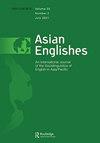为什么要保持沉默?泰国英语教学大学学生的心声
IF 1.8
Q1 LINGUISTICS
引用次数: 2
摘要
本文章由计算机程序翻译,如有差异,请以英文原文为准。
Why keep silent? Voices from Thai EFL students in an English-medium instruction university
ABSTRACT In a collectivistic society such as Thailand, quiet students are considered as demonstrating negative academic performance in English as a foreign language (EFL) classrooms. This phenomenological study attempted to provide insights relating to the silence of Thai EFL students in a university context where English is the primary medium of instruction. In-depth interviews and self-reflection of 35 first-year students were carried out at an autonomous public university, situated in the north of Thailand, where this is the case. Given this context, students were quiet in the classroom for several reasons such as personality traits, learned behaviors, situational factors, the role of the teacher, and the teaching approach. Additionally, cultural factors were identified as a significant reason for this behavior in English intensive courses. The pedagogical implication for the EFL context is also discussed.
求助全文
通过发布文献求助,成功后即可免费获取论文全文。
去求助
来源期刊

Asian Englishes
LINGUISTICS-
CiteScore
3.30
自引率
18.80%
发文量
34
期刊介绍:
Asian Englishes seeks to publish the best papers dealing with various issues involved in the diffusion of English and its diversification in Asia and the Pacific. It aims to promote better understanding of the nature of English and the role which it plays in the linguistic repertoire of those who live and work in Asia, both intra- and internationally, and in spoken and written form. The journal particularly highlights such themes as: 1.Varieties of English in Asia – Including their divergence & convergence (phonetics, phonology, prosody, vocabulary, syntax, semantics, pragmatics, discourse, rhetoric) 2.ELT and English proficiency testing vis-a-vis English variation and international use of English 3.English as a language of international and intercultural communication in Asia 4.English-language journalism, literature, and other media 5.Social roles and functions of English in Asian countries 6.Multicultural English and mutual intelligibility 7.Language policy and language planning 8.Impact of English on other Asian languages 9.English-knowing bi- and multilingualism 10.English-medium education 11.Relevance of new paradigms, such as English as a Lingua Franca, to Asian contexts. 12.The depth of penetration, use in various domains, and future direction of English in (the development of) Asian Societies.
 求助内容:
求助内容: 应助结果提醒方式:
应助结果提醒方式:


